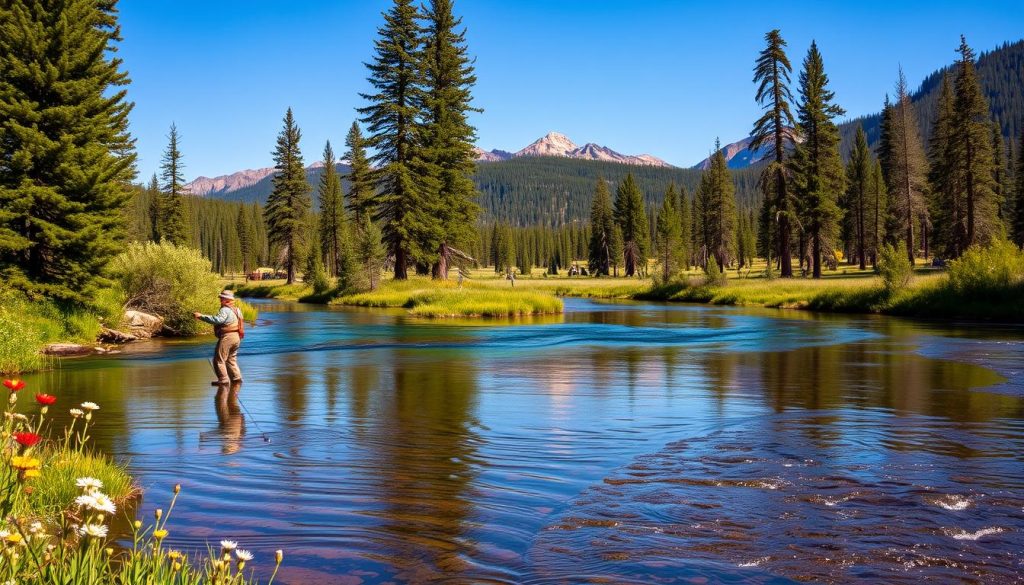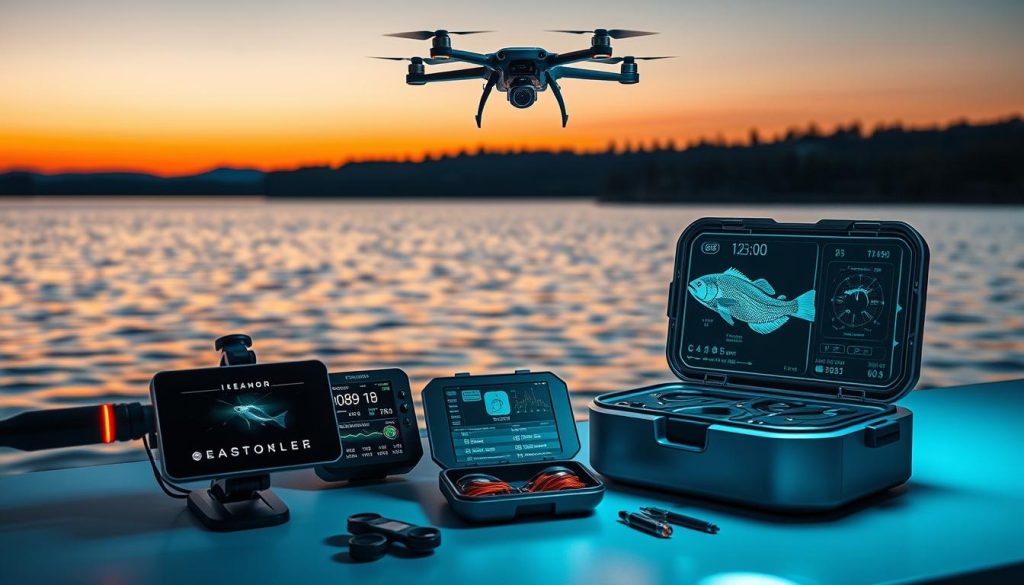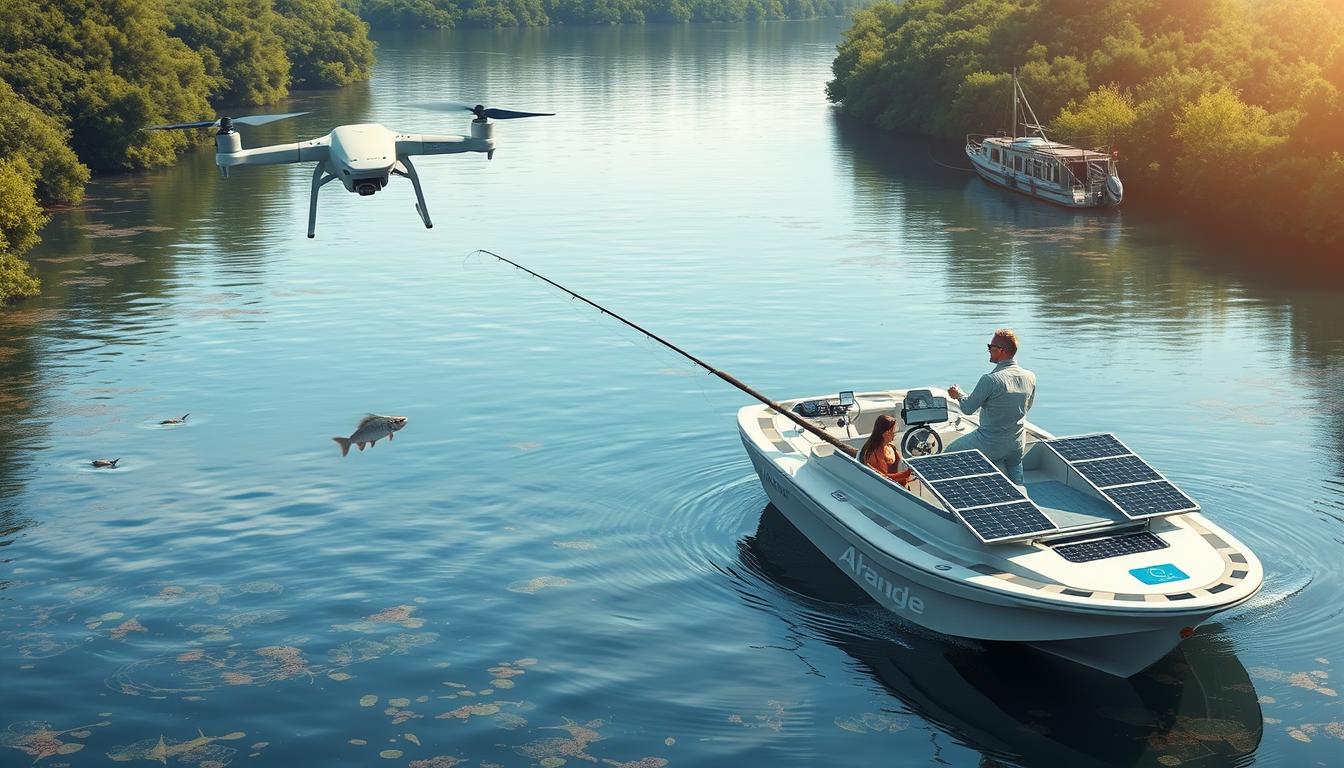As we near 2025, fishing in America is changing fast. New gear, tech, and rules are making the sport exciting. This guide will explore these changes and how they’re changing fishing.
In 2025, fishing will use advanced tools like forward-facing sonar. This lets anglers find fish more easily. Virtual and augmented reality will also change how we plan and go fishing. These tools make fishing better and help us fish more responsibly.
Fishing is also becoming more about caring for the environment. Anglers are catching and releasing fish more often. This helps keep fish populations healthy and supports the sustainability movement. It also means future anglers will have a healthy sport to enjoy.
New rules are coming to fishing in 2025. These rules aim to make fishing safer and more ethical. They include strict safety rules and penalties for bad behavior. These changes will help fishing stay strong for years to come.
Whether you’re new to fishing or have been doing it for years, the future is bright. This article will show you the trends, tech, and rules that are changing fishing. It gives a sneak peek at what’s coming in the sport.
Key Takeaways
- Fishing in America is embracing cutting-edge technologies, including forward-facing sonar and virtual/augmented reality applications.
- Sustainable practices, such as catch-and-release methods, are gaining traction among anglers to protect fish populations and preserve the health of our waterways.
- Evolving regulations are shaping the future of fishing, emphasizing safety, ethical conduct, and responsible practices.
- The fishing community is becoming more diverse, with increased participation from individuals of all backgrounds, indicating a positive trend towards inclusivity.
- The future of fishing promises a blend of innovation, environmental stewardship, and a renewed appreciation for the thrill and serenity of the sport.
The Rise of Fly Fishing: A Serene and Sustainable Pursuit
Fly fishing is becoming more popular, attracting anglers of all levels. It offers a mix of relaxation and challenge. The sport is loved for its connection with nature and the art of catching fish. Its sustainable practices and beautiful destinations make it appealing in North America.
Connecting with Nature: The Appeal of Fly Fishing
Fly fishing lets people enjoy the outdoors in a unique way. Places like Yellowstone National Park and the Florida Keys offer peaceful experiences. The sport’s slow pace and the thrill of catching a fish make it meditative and rewarding.
Top Fly Fishing Destinations in North America
North America has many top fly fishing spots. Each offers a special experience for anglers. Here are some of the best places in 2025:
- Yellowstone National Park, with its clear mountain streams full of trout
- The Bow River in Alberta, Canada, famous for rainbow and brown trout
- Henry’s Fork in Idaho, known for its challenging fishing and beautiful views
- The Florida Keys, where anglers can catch bonefish, tarpon, and permit
- The Deschutes River in Oregon, great for steelhead and trout
- The Green River in Utah, known for dry fly and nymph fishing
- The Miramichi River in New Brunswick, Canada, famous for Atlantic salmon
These destinations offer anglers a chance to enjoy nature while improving their skills. They are perfect for those who love fly fishing.

Fishing 2025: Embracing New Technologies and Regulations
Fishing is changing, and anglers and groups are finding a balance. They want to use new tech but keep the sport’s traditions alive. A big focus is on forward-facing sonar (FFS) in bass fishing tournaments.
The Forward Facing Sonar Debate: Balancing Tradition and Innovation
The National Professional Fishing League (NPFL) has banned FFS in official practice and competition. They want to keep the sport’s core skills and the bond between anglers and fish.
FFS tech gives anglers great insights. But the NPFL wants to keep bass fishing true to its roots. Starting in 2025, all boats in Major League Fishing circuits will be limited to two forward-facing or 360-degree sonar transducers in any combination.
The FFS debate shows the bigger challenge of mixing tech with tradition. As fishing evolves, anglers and organizers must find ways to welcome fishing innovation. They must also make sure everyone has a fair chance and the sport’s culture is respected.

The NPFL has a detailed plan for fishing technology in bass fishing tournaments. This includes:
- Limiting FFS and 360-degree sonar use in certain times
- Letting anglers use these techs freely during practice
- Keeping traditional bass-fishing techniques in youth and amateur events
The NPFL is trying to balance fishing regulations and new tech. They want bass fishing tournaments to stay true to their roots but also look forward to new possibilities.
Sustainable Angling: Protecting Our Waterways for Tomorrow
Fishing’s popularity is growing, and so is the focus on sustainable fishing and caring for our environment. Fly fishing groups and anglers are pushing for catch-and-release fishing, fishing conservation, and smart fisheries management. This helps keep our waterways healthy for future anglers.
Every year, one in six Americans go fishing, adding $148 billion to the U.S. economy. They also help protect our waterways, contributing $1.8 billion annually. This support creates 90,000 jobs and helps keep our waterways healthy.
The Conservationist of the Year award honors those who help protect our environment. In 2025, the nomination deadline is November 1, 2024. The winner gets a $10,000 check from Simms Fishing Products. Past winners like Gary Horvath and Sandy Moret have worked hard to protect rivers and promote catch-and-release fishing.
By adopting sustainable angling practices and supporting conservation, we can keep our waterways healthy. Together, we can protect our aquatic ecosystems and enjoy fishing for years to come.
The Evolution of Fishing Tournaments in 2025
The sport of competitive fishing is changing fast. The American Bass Anglers American Fishing Tour has new rules for 2025. These updates focus on safety, sportsmanship, and fairness.
Now, anglers must show proof of liability insurance. They also have to follow strict safety rules. Tournament organizers want to make sure everyone acts professionally and ethically.
These changes aim to make tournaments better and keep the sport healthy. As fishing tournaments grow, organizers are balancing tradition and new ideas. They want to keep the sport exciting and popular in 2025 and beyond.

